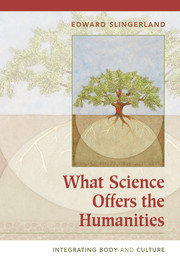Book contents
- Frontmatter
- Contents
- Figures
- Preface
- What Science Offers the Humanities
- Introduction
- PART I EXORCISING THE GHOST IN THE MACHINE
- PART II EMBODYING CULTURE
- PART III DEFENDING VERTICAL INTEGRATION
- 5 Defending the Empirical: Commonsense Realism and Pragmatic Truth
- 6 Who's Afraid of Reductionism? Confronting Darwin's Dangerous Idea
- Conclusion
- Appendix: Embodying Culture: Selected Bibliography and Other Resources
- References
- Index
5 - Defending the Empirical: Commonsense Realism and Pragmatic Truth
Published online by Cambridge University Press: 05 June 2012
- Frontmatter
- Contents
- Figures
- Preface
- What Science Offers the Humanities
- Introduction
- PART I EXORCISING THE GHOST IN THE MACHINE
- PART II EMBODYING CULTURE
- PART III DEFENDING VERTICAL INTEGRATION
- 5 Defending the Empirical: Commonsense Realism and Pragmatic Truth
- 6 Who's Afraid of Reductionism? Confronting Darwin's Dangerous Idea
- Conclusion
- Appendix: Embodying Culture: Selected Bibliography and Other Resources
- References
- Index
Summary
In chapters 1 through 4, i have presented a fair amount of empirical evidence for various positions, observing that X and X (2003) “found” that Y was the case, or that the results of X (2001) “suggest” that Z is true. There are several ways you can take statements like this. You may follow me in taking such evidence as constituting a fairly convincing case in support of position Y or Z. Alternately, you may be committed to empirical inquiry, but see these particular cases as flawed studies that – because of poor experimental design or variables not considered by the experimenters – fail to demonstrate what they are intended to demonstrate. Finally, you may be a social constructivist and feel that any reference to empirical evidence is merely a bit of rhetorical handwaving: supposedly “empirical” studies reveal nothing outside of the presuppositions and expectations of the experimenters involved, and thus they are not in any way epistemologically superior to other forms of rhetorical assertion. In our modern Western culture, however, “science” has been accorded a privileged status as the new official religion, so dressing up assertions in a sciencelike garb is a very effective strategy. To a committed postmodernist, my push for vertical integration is best seen as a rhetorical gambit designed to advance my personal opinions by borrowing some of the prestige of science, and by throwing in a bunch of impressively scientific-sounding references to give my arguments a specious appearance of gravitas.
- Type
- Chapter
- Information
- What Science Offers the HumanitiesIntegrating Body and Culture, pp. 221 - 249Publisher: Cambridge University PressPrint publication year: 2008



